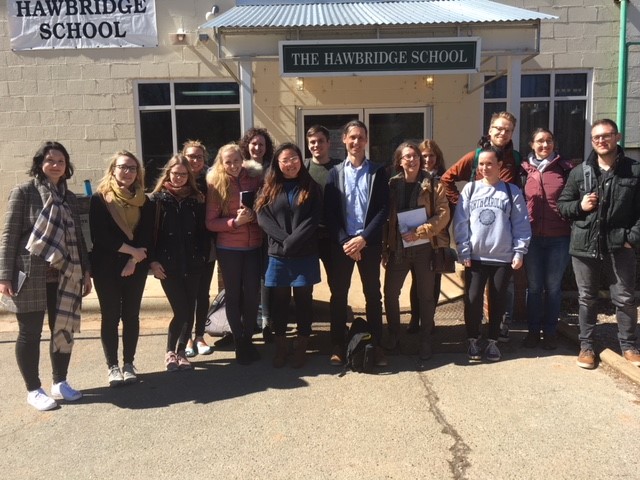
A group of students from the University of Hamburg in Germany recently spent a month learning about the American education system through a partnership with the UNC School of Education.
And soon, 11 students in the school’s Master of Arts in Teaching program will head to Hamburg to get a taste of the German culture and its education system.
The students, led by Clinical Assistant Professor Lori Edmonds, will leave for a month-long stay in Hamburg, Germany on May 15. The students will be placed in a school and paired with a mentor who teaches their subject of interest. They will be living with host families during their visit.
The trip in May will mark the fourth time School of Education students have participated in the German exchange program with the University of Hamburg. The students will also take part in seminars and educational trips to enhance their experience, including a visit to a former concentration camp.
The University of Hamburg students arrived in Chapel Hill in late February and left in late March. Their visit here also included working in area schools alongside teachers who served as mentors, and touring schools such as The Hawbridge School, a public charter school in Saxapahaw.
The German students are all student teachers in what would be the equivalent of the School of Education’s Master of Arts in Teaching program. They all teach English as a Foreign Language in Germany and one other subject, said Andreas Bonnet, an education professor at the University of Hamburg who accompanied the German student teachers to Chapel Hill.
Lucas Hansen is a history teacher who interned at McDougle Middle School in Chapel Hill. He said one of the differences he noticed here compared to the German education system is the use of media and technology in the classroom, and students’ easy access to computers.
“(I) feel like the U.S. system, or North Carolina at least from what I can tell, is very much advanced in that regard compared to the German school system,” Hansen said.
Sabrina Freier, a math teacher, said she had no preconceived notions about the American education system prior to visiting.
“I just heard that studying to the test is a big thing,” Freier said, adding that she feels that restricts teachers from teaching more life-related skills.
Sian Li, who will graduate with her master’s in education in May and hopes to be an elementary school teacher, is among the UNC students who will travel to Germany.
Li, who attended kindergarten in Germany, recalled reading an article as an undergraduate that compared the education systems in the United States, Japan and Germany. She was surprised about what she learned of the German system.
“It was just such a different system than the U.S,” she said.
One difference she recalled is the way the German system tracks its students. Li said the system determines from an early age whether students will move on into higher education or study some type of trade.
Li said she is looking forward to experiencing the education system for herself and seeing how the German culture responds to the teaching profession.
Li added that she likes how the School of Education’s German study abroad program connects students from both countries and helps them build and foster relationships. Li accompanied the German students on some of their trips during their stay here, and the German students will also be helping the students from the School of Education get acclimated in Germany.
As part of the study abroad experience, Edmonds’ said the UNC students will do a capstone project while in Germany. The students have obtained copies of the strategic plans for the schools where they did their student teaching. Edmonds has asked them to look at what parts of those plans might be interesting to question, consider the problem and how the German schools deal with it, and address it in a blog. The students will also be able to present the findings from their research in Germany to the schools where they interned in North Carolina.